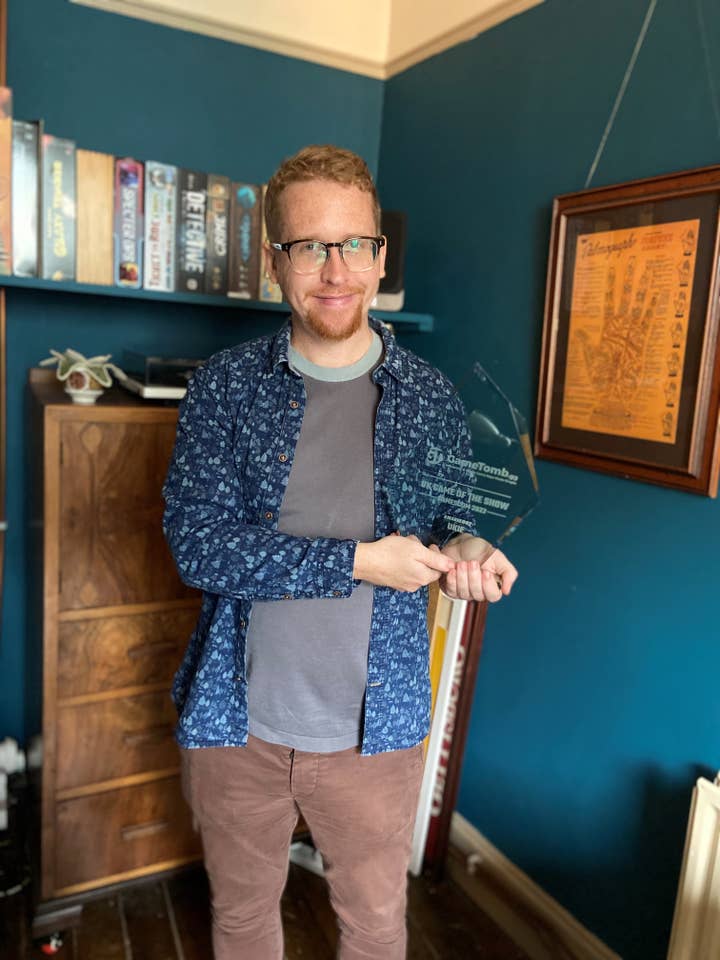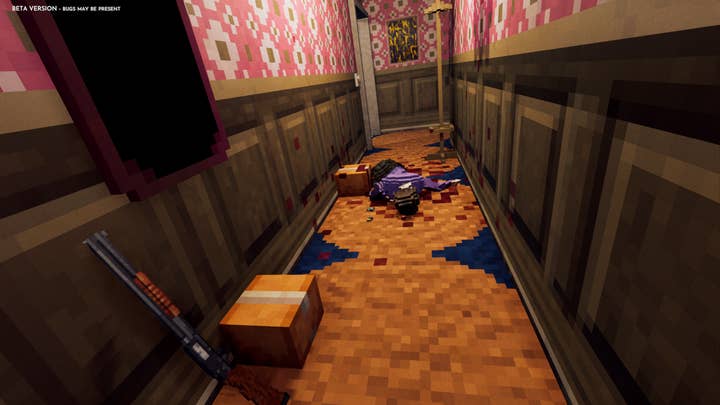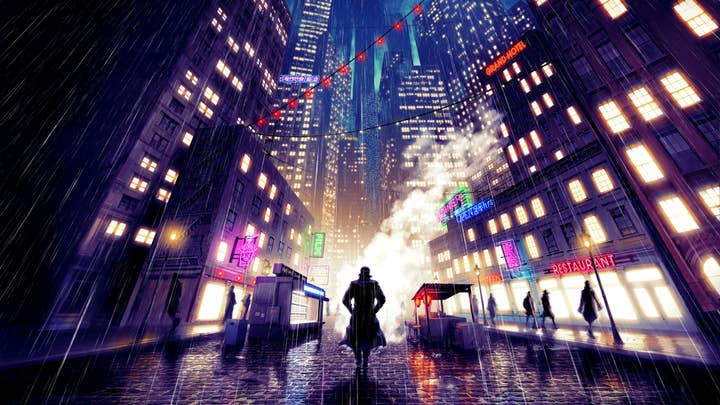Making a true detective game in Shadows of Doubt
Cole Jeffries on the power of giving players agency and the systems behind his upcoming procedurally-generated murder mystery
There's a knock at the door of your apartment. By the time you get there, whoever knocked has slipped a note underneath and left. The note says 'Find E. Smith.' You recall seeing a telephone directory on a table and you look up E. Smith, revealing both their address and phone number. There's no answer when you ring, so you take a short walk to that address.
You find E. Smith, dead. Now you need to look for clues.
This is an example of how a typical playthrough of upcoming detective game Shadows of Doubt might begin. Aside from the arrival of the note, none of the above is scripted or spelled out via in-game text and directions – it's down to players to figure out how to proceed.

Cole Jeffries, founder of developer ColePowered Games, tells GamesIndustry.biz that agency is the primary focus of this title, empowering players to feel like they're truly solving a mystery.
"There are a whole bunch of detective games out there, but I do find a lot of them are telling you the story of being a detective, rather than you actually being the detective," he says.
He cites Sam Barlow's Her Story as one of the rare exceptions, as well as one of the inspirations behind Shadows of Doubt. But while Barlow's game relied on a single character's words to spark ideas within players on how to progress, Jeffries' title is much more typical detective fare.
Searching the scene of a crime may yield fingerprints or footprints. Most buildings have CCTV cameras so if you find a way into the security room, you can review the footage. This in turn will grant you more options when questioning neighbours or other NPCs about what has occurred, enabling you to ask if they have seen a specific person.
"I wanted to give the player a lot of agency, and that’s about building the tools and avenues for that investigation," Jeffries explains. "We’ve just tried to build as many different paths to get to the answer as possible. The telephones, for example: the citizens call each other in-game, so you can trace calls and things like that. That’s another avenue of exploration.
"All these tools combine together to hopefully create a means of meaningful investigation for the player. It allows them to choose which one to use. It’s the selling point of the game, really. I just wanted a detective game that allowed you to actually be the detective instead of being told a story."
"There are a whole bunch of detective games out there, but a lot of them tell you a story about being a detective"
It's the agency, combined with the indie game's scope and ambition, that convinced GamesIndustry.biz to select it as the winner of UKIE's UK Game of the Year prize at Gamescom earlier this year. The contest, sponsored this year by PR agency Dead Good, highlights the most promising unreleased game by a UK developer.
Shadows of Doubt is currently in development for PC and due for release next year. While there are no plans at this point for a console port, Jeffries does not rule it out and observes that he and his team are also working on making the game compatible with Steam Deck.
Work on the game began over six years ago, and the concept was originally for a detective management sim that played from a top-down perspective. Central to the project was Jeffries' interest in populating the game's world with citizens that went around living their lives around the player's actions. He managed to set up these systems, but a year or so into the project he realised it wasn't quite clicking: "It felt like you should really be in that world, rather than just looking at it," he explains.
He pivoted to a first-person perspective, changed the player role from manager to detective, and Shadows of Doubt began to take shape.

Further adding to the agency, Shadows of Doubt's murder mysteries are not designed by the developer; instead, they are procedurally generated and drawn up from the citizens that are simulated across the in-game city. Even the city is procedurally generated, so locations are different every time – although players will be able to share seed generation codes so they can see if they can tackle the same mystery their friends have already managed.
As with any use of procedural generation, Jeffries has had to spend a lot of time working on guidance and failsafes for the game so that each crime players tackle is actually solvable. So the killer will always leave fingerprints at the murder scene, so you have at least one clue to start with. If you struggle to catch the killer within a certain time limit, they will kill again, which generates more clues.
"I wanted to give the player a lot of agency, and that’s about building the tools and avenues for that investigation"
Players are able to keep track of the information they've found, and the connections they've deduced, via a 'crime board'-style menu. They can choose which clues to pin and use coloured string to highlight potential connections. The developer has even taken steps to account for any clues players might miss; an in-game newspaper reports on each murder, listing everything found at the scene of the crime.
"Although it might feel like you’re not doing a great job, we always want to make sure the information is available and isn't lost completely," Jeffries explains. "It’s about building avenues of investigation, so fingerprints, footprints, and then the victim ID. Who did they know, and who’s in their address book? Usually it’s someone they know that’s killed them. Just little things like that we can use as failsafes to make sure that the killer can be caught."
The fact there are connections between killers and victims is a further demonstration of how far Jeffries goes with the simulated citizens of his game. The notion of intelligent NPCs living their lives was inspired in part by The Elder Scrolls: Oblivion, he tells us, as well as the issues Bethesda ran into.
"I remember reading about Oblivion AI all those years ago," he says. "One of their problems was they made it almost too dynamic, where it was stealing stuff from their other AI. It created a whole economy in the world, because people were stealing, and someone was collecting all the cheese. I think they had to pare it down.
"Although it might feel like you’re not doing a great job, we always want to make sure the information is available"
"With Shadows, because it’s a detective game, it makes it more about the AI as a subject, rather than just a thing that’s layered on top. In Skyrim, it’s more about the combat, and you’re going into these dungeons and doing that. The AI can be a part of it, but you’re mostly interacting with the combat side of it. But with Shadows, it’s a detective game, so you’re interacting with the stuff the AI does."
A few limits have been put in place – there are no cheese hoarders, for example – but by and large the NPCs are able to do what they please. They go to work, they go out for a drink, they come home and sleep at night. And their attributes and characteristics can play into the central mystery. For example, each citizen has a shoe size. Find size eight footprints at a murder scene, and you automatically have a pool of suspects.
Each city Shadows of Doubt generates can have between 250 and 300 citizens living in it. That already seems a little overwhelming, but Jeffries says he's been careful to also limit the actual size of the city to make exploring it and keeping track of its residents more manageable.
"It’s much smaller than your typical open-world game, but the plus side to that is that you can go anywhere," he concludes. "Everywhere is simulated. Each person has their apartment that they can go in, and you can go in as a player. Having that much explorable world, it can’t be the size of Skyrim or Cyberpunk, or anything like that. But most of the buildings are skyscrapers, so if you’ve got 17 floors within most of those buildings, and you know you can go in there, it doesn’t really make it feel small."
Sign up for the GI Daily here to get the biggest news straight to your inbox

